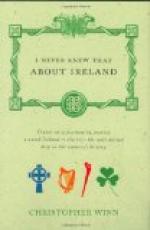“Let us follow still further what happened. The shopkeepers, finding their trade quite gone, for it was almost worth a person’s life to go into their shops, watched as they were by paid spies, had to capitulate to the League. An abject apology and a promise to let themselves be evicted next time were the price they had to pay to be allowed in a free country to carry on their trade. Ruin faced them both ways. After having the ban of boycotting taken off them, with eviction not far distant, most of them held clearance sales, at tremendous sacrifices, so as to be prepared for moving. One man is reputed to have got rid of seven thousand pounds’ worth of goods under these circumstances. Of the other division, who allowed their places to be sold, most of them are now evicted. Dozens of shop assistants, needlewomen, and others connected with the trade of a thriving town, are thrown out of employment, and a peaceful neighbourhood has been changed into a scene of bloodshed and violence.
“I appeal to the English people not to encourage or support a vile system of intimidation and violence, a system which not only pursues and ruins its enemies, but refuses to allow peaceably-inclined people to remain neutral. A case like this should not be one of Party politics, but should be looked upon as the cause of all who wish to pursue their lawful vocations peaceably against those who wish to tyrannise by terror over the community at large.
“I am, Sir, your obedient servant,
“FOEDI FOEDERIS ADVERSARIUS.”
“December 12.”
My private letters strengthen and confirm every word of this account; and the following letter is again a proof of personal tyranny and political malevolence not reassuring as qualities in the governing power:—
“TO THE EDITOR OF THE ‘TIMES.’
“Sir,—I have received a letter from my friend Mr. Edward Phillips, of Thurlesbeg House, Cashel, and the round, unvarnished tale that he delivers throws more light upon Ireland than any amount of the windy rhetoric which is so plentifully displayed on Parnellite and Gladstonian platforms. Mr. Phillips writes as follows:—
“’I hold 270 acres from Mr. Smith-Barry at a rent of L340 under lease and tenant-right, which, with my improvements, I valued at L1,000. The Land League have decided, thinking to hurt Mr. Smith-Barry, that all tenants must prepare to give up their farms by allowing themselves to be evicted. They are clearing off everything, and because I refuse to do this, and forfeit my L1,000, I am boycotted in the most determined manner. I am refused the commonest necessaries of life, even medicine, and have to get all from a distance. Blacksmiths, &c., refuse to work, and labourers have notice to leave, but have not yet done so.
“’Heretofore people were boycotted for taking farms; I am boycotted for not giving up mine, which I have held for 25 years. A neighbour of mine, an Englishman, is undergoing the same treatment, and we alone. We are the only Protestant tenants on the Cashel estate. The remainder of the tenants, about 30, are clearing everything off their land, and say they will allow themselves to be evicted.’




